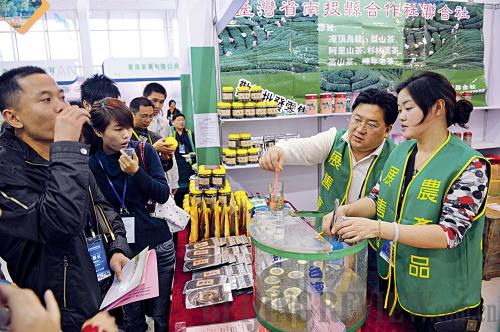|
 |
|
MAINLAND OPPORTUNITY: Sales persons from a Taiwan company introduce their tea products to mainlanders at a farm produce fair in Fujian Province, in November 2009 |
The year 2009 witnessed new progress in cross-Taiwan Straits relations. They were ushered into a new stage featuring more frequent communication, broader cooperation and faster development.
Closer Links
After the Kuomintang returned to power in Taiwan in May 2008, the mainland took the opportunity to improve cross-Straits relations. On December 31, 2008, General Secretary Hu Jintao of the Central Committee of the Communist Party of China put forward six proposals to promote the peaceful development of cross-Straits relationship, which has advanced comprehensive relations across the Taiwan Straits.
New cross-Straits negotiation and communication mechanisms have developed. During the third and fourth meetings of leaders of the mainland's Association for Relations Across the Taiwan Straits and Taiwan's Straits Exchange Foundation, two sides signed six agreements. At the Fifth Cross-Straits Economic, Trade and Culture Forum held in July 2009, mainland and Taiwan representatives reached six consensuses on promoting cultural exchanges and educational cooperation across the Taiwan Straits. The Straits Forum held in Xiamen, Fujian Province, in May promoted people-to-people communication. Leaders from both sides of the Straits also took advantage of the Boao Forum for Asia and the Asia-Pacific Economic Cooperation (APEC) economic leaders' meeting to exchange opinions.
Cross-Straits economic, trade and cultural exchanges reached unprecedented levels in 2009. To help Taiwan come out from under the shadow of the global financial crisis, the mainland released a series of policies for the benefit of Taiwan people. Moreover, the mainland sent several procurement missions to Taiwan that made purchases worth more than $10 billion. In November, regulatory bodies of the mainland and Taiwan signed a memorandum of understanding on cross-Straits financial supervision, which is expected to enhance complementarity of financial sectors on both sides of the Taiwan Straits and promote their common development. Negotiations of an Economic Cooperation Framework Agreement (ECFA) were launched to establish a trading mechanism that can best accommodate the mainland and Taiwan. In the first 10 months of 2009, cross-Taiwan Straits trade reached $83.64 billion.
Cultural and educational exchanges and cooperation across the Taiwan Straits also progressed quickly last year. The mainland alone launched more than 1,000 cultural exchange projects, rising 40 percent year on year.
Personnel exchange across the Taiwan Straits also expanded dramatically. Since the three direct links of mail, trade and air and shipping services were realized across the Taiwan Straits at the beginning of 2009, 25 provinces and municipalities on the mainland have allowed their residents to travel to Taiwan as tourists. In the first 11 months of last year, a total of 547,000 mainlanders visited Taiwan and it has been estimated they brought revenue of $1 billion to the island's tourism industry. Especially the Taiwan visits by several provincial-level officials of the mainland have elevated the level of cross-Straits personnel exchanges.
Confrontation over Taiwan's international participation, which remained tense during former Taiwan leader Chen Shui-bian's tenure, has eased. In May 2009, Taiwan attended a World Health Assembly session in Geneva, Switzerland, as an observer for the first time. It was the first time in 38 years that Taiwan had participated in a meeting hosted by a UN agency since it lost its UN membership in 1971. In the following November, General Secretary Hu met with Kuomintang Honorary Chairman Lien Chan when they attended the APEC economic leaders' meeting in Singapore. Taiwan has also acceded to the World Trade Organization's Agreement on Government Procurement.
The improvement of cross-Straits relations has provided better internal and external conditions for the mainland's drive to build a more prosperous society. With the ending of a risky period for cross-Straits relations during the Chen authorities in Taiwan, the mainland is now able to better reallocate its resources and focus on economic development.
Economic and social pillars for the establishment of a cross-Straits peaceful development framework have progressed steadily. The expected signing of the ECFA will lay the foundation for the economic part of the cross-Straits peaceful development framework. In the meantime, closer trade ties and greater personnel exchanges will help people on both sides to overcome misunderstandings about each other and expand common interests. This will garner stronger public support for building the framework.
| 